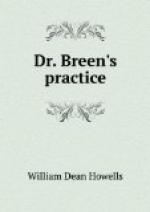She half rose in response to his questioning bow, and he motioned her to her seat again. “I had to keep you waiting,” he said. “I was up all night with a patient, and I was asleep when my mother called me.” He stopped here, and definitively waited for her to begin.
She did not find this easy, as he took a chair in front of her, and sat looking steadily in her face. “I’m sorry to have disturbed you” “Oh, not at all,” he interrupted. “The rule is to disturb a doctor.”
“I mean,” she began again, “that I am not sure that I am justified in disturbing you.”
He waited a little while for her to go on, and then he said, “Well, let us hear.”
“I wish to consult with you,” she broke out, and again she came to a sudden pause; and as she looked into his vigilant face, in which she was not sure there was not a hovering derision, she could not continue. She felt that she ought to gather courage from the fact that he had not started, or done anything positively disagreeable when she had asked for a consultation; but she could not, and it did not avail her to reflect that she was rendering herself liable to all conceivable misconstruction, —that she was behaving childishly, with every appearance of behaving guiltily.
He came to her aid again, in a blunt fashion, neither kind nor unkind, but simply common sense. “What is the matter?”
“What is the matter?” she repeated.
“Yes. What are the symptoms? Where and how are, you sick?”
“I am not sick,” she cried. They stared at each other in reciprocal amazement and mystification.
“Then excuse me if I ask you what you wish me to do?”
“Oh!” said Grace, realizing his natural error, with a flush. “It is n’t in regard to myself that I wish to consult with you. It’s another person—a friend”—
“Well,” said Dr. Mulbridge, laughing, with the impatience of a physician used to making short cuts through the elaborate and reluctant statements of ladies seeking advice, “what is the matter with your friend?”




